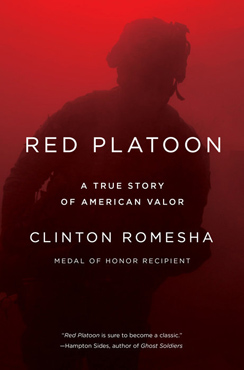Book excerpt: "Red Platoon"
On October 3, 2009, Command Outpost Keating in the Nuristan province of Afghanistan was attacked by more than 300 Taliban fighters. They quickly overran Keating's defenses, and breached its perimeter.
Former Army Staff Sergeant Clint Romesha led a small group of soldiers in a counterattack against seemingly insurmountable odds. In doing so, he saved dozens of American lives, and would later receive the Medal of Honor, the United States' highest military award.
In this excerpt from "Red Platoon: A True Story of American Valor" (Dutton), Romesha's firsthand account of the battle, he describes the moment when the tide began to turn.
By now, many members of Red Platoon who were not actively fighting on the perimeter or dead had holed up inside our barracks, in what would come to be called the Alamo position, where they were joined by some guys from Blue and HQ Platoons, plus a handful of extremely confused and frightened Afghan soldiers. It was an eclectic mix that included a number of our youngest and most traumatized soldiers, along with some experienced hands. There were some aggressive badasses like Pfc. Christopher Jones and Spc. Thomas Rasmussen, aka Raz, and there were some guys like Kyle Knight, who fell closer to the timid end of the spectrum. Finally, there were also a few guys like Matthew Miller -- a sergeant with Headquarters Platoon who had arrived at Keating less than forty-eight hours earlier -- who were simply wondering how in the hell they'd gotten themselves into this fix.
For the last ten or fifteen minutes, these men had been trickling through the door from every direction, driven inside by the knowledge that our defenses were breached and that our perimeter could no longer hold. Some were clearly freaked out -- stricken with fear or shuddering on the verge of all-out panic. All of them knew that things were getting worse, not better. And not one of them, if you'd asked at that moment, would have told you that he expected to live beyond the next thirty minutes.
"It's pretty bad out there right now," Raz said to Armando Avalos, one of our forward observers. "If you go out, you're just gonna die."
Most of these guys were lying on the floor with either a machine gun or their carbines, and when I burst through the door, they all looked up at the same time.
Part of what defines an effective leader at the level of an infantry platoon is knowing that in difficult situations, actions carry greater weight than words. In that moment, I could not have asked these men to participate in a counterattack unless I demonstrated that I was willing to take part in it myself and run the show.
"We're going to take this bitch back," I announced. "I need a group of volunteers. Who's with me?"
During the pause that followed -- the silent interval when the guys in that room stared up and took in what I'd just said -- I'm pretty sure that each of them was convinced that I'd lost my marbles. Judging by the looks on their faces, their collective response seemed to amount to a single question:
Are you frickin' kidding?
Then Raz, the former meth addict who had never finished high school and who had lived in people's basements until he joined the army, stood up -- all six and a half feet of him.
Half a second later, Jones and Miller, the new arrival, rose as well. They were joined by two additional men.
"We'll follow you anywhere," declared Raz. "What are we doing?"
Five guys. I had my team.
I gave them a quick sketch of the plan and where we'd be heading.
"One last thing, guys," I said, pointing to the west door, where we'd make our exit. "There are no friendlies on the other side. Even if they're wearing an American uniform, do not hesitate to shoot first. Anybody you see in front of you is hostile. Roger that?"
I got five nods in response.
"All right, then -- let's roll."
As I moved toward the door, there was one thing left unsaid -- a part of this mission that I hadn't bothered to mention in the briefing I'd just given.
We were launching a counterattack for a range of reasons. To regain our ammo supply. To seal off our front gate. To push the Taliban back beyond the wire. To take back our house, and to unleash some intensely violent payback on the men who had slaughtered our comrades. But there was another objective as well -- one that, in some ways, transcended everything else.
It was well known that the Taliban placed great value on American bodies, which they removed from the battlefield and filmed, then posted the resulting videos on the Internet. If that happened with any of the rest of my team, those of us who survived would spend the rest of our lives trying to get those YouTube images out of our heads.
For these reasons, we had to get our dead back too -- even if the effort to retrieve them might entail losing more guys, me included. Given what we stood for and what we believed in, we really had no other choice.
Reprinted by arrangement with Dutton, a member of Penguin Group (USA) LLC, A Penguin Random House Company. Copyright © Clint L. Romesha, 2016.
For more info:
- "Red Platoon: A True Story of American Valor" by Clinton Romesha (Dutton); Also available in eBook, Digital Audio Download, and Audio CD formats
